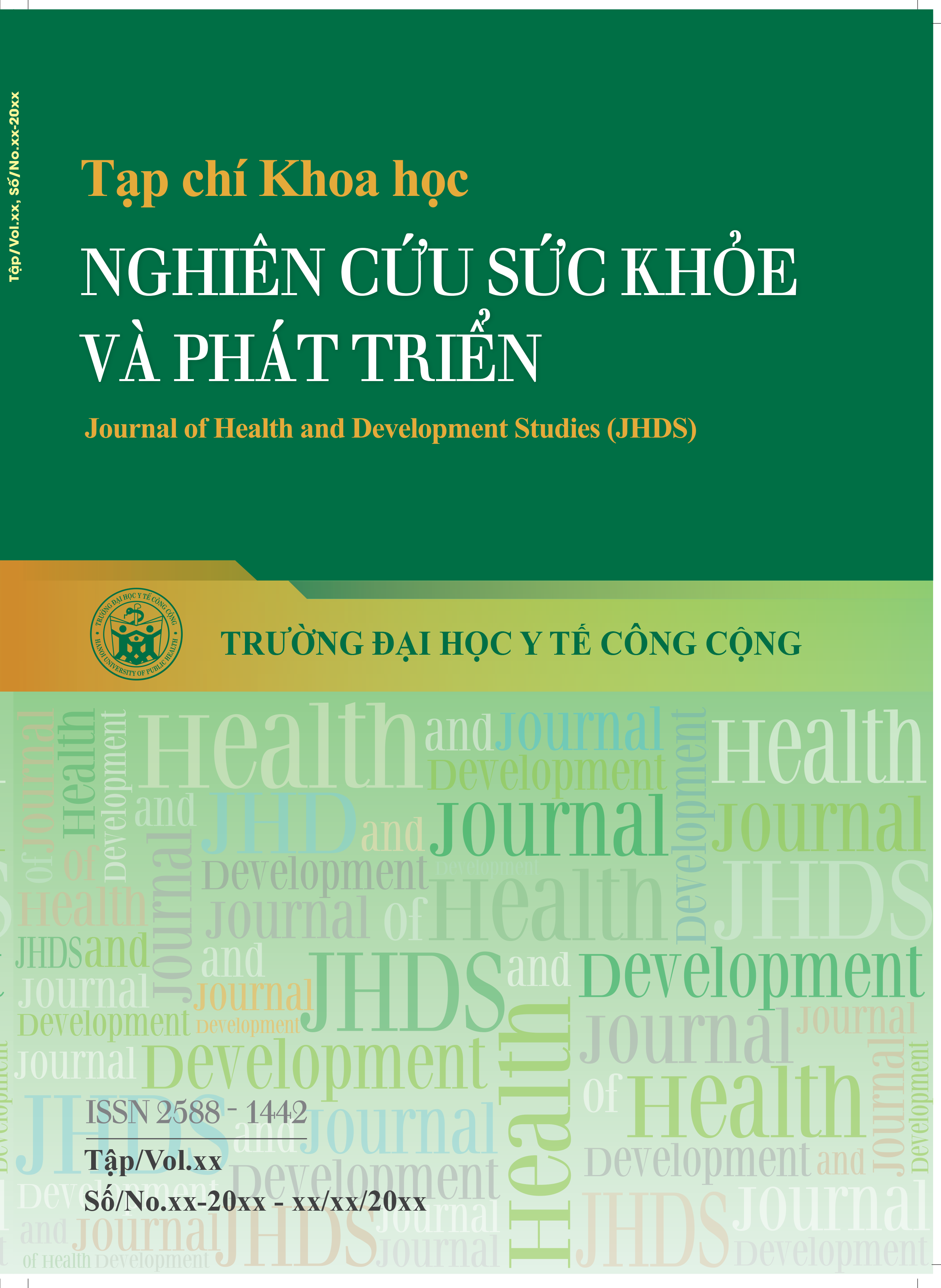Tạp chí
Khoa học Nghiên cứu Sức khỏe và Phát triển
(Journal of Health and Development Studies – JHDS)
Trường Đại học Y tế công cộng
ISSN (Print): 2588-1442
ISSN (Online): XXXX-XXXX
https://jhds.edu.vn
Factors affecting quality of life of hemodialysis patients at Binh Phuoc Hoan My hospital, Vietnam
- Mã bài báo : SKPT_23_109
- Ngày xuất bản : 29/02/2024
- Số trang : 37-48
- Tác giả : Ngo Hoang Anh
- Lượt xem : ( 548 )
Danh sách tác giả (*)
- Ngo Hoang Anh 1 - HCMC Hospital of Dermato Venereology, VietNam
- Bui Thi Thanh Binh 1 - Hoan My Binh Phuoc Hospital, BinhPhuoc, VietNam
- Ho Thi Hien 2 - Hanoi University of Public Health
- Tran Thi Diem Hang 3 - VietNam Institute of Public Health Ho Chi Minh City, VietNam.
Object: Hemodialysis is the common treatment that causes different problems affecting the quality of life (QoL) of chronic kidney disease patients. This study aims to examine the associated factors related to QoL in patients with end-stage kidney disease (ESKD).
Methods: The study employed a cross-sectional design and was conducted from January- November 2022. Data was collected from 78 patients who have hemodialysis using a validated KDQOL-SFTM questionnaire version 1.3 often used to assess the QoL for patients on hemodialysis (HD). There was 01 focus group discussion with Chronic Kidney Disease (CKD) patients and 04 in-depth interviews with management staff. T-test and ANOVA were conducted to analyze quantitative variables.
Results: Among the 78 study patients, the total QoL in the patients as shown by KDQOL-SFTM was 54.28 ± 4.98. In which, the SF-36 score was 51,27 ± 7,15 and the KDQOL score was 57.29 ± 5.98. Some demographic characteristics were associated with the low QoL score among ESKD patients such as elderly people (aged 60 years old or over), occupation pensioner/elderly, unemployment (p<0.001, t=4.3, 95%Cl: 2.4 to 6.4), and some other characteristics of diseases are longer duration of disease >5 years (p=0.006), duration of HD >3 years (p=0.001); Family factors were also associated with QoL: distance from home to hospital over 5km (p=0.014, t = 2.5, 95% CI: 0.6 to 5.1), family income (poor and near-poor households) (p<0.001, t=-3.7, 95% Cl: -10.4 to -3.1), and Social factors: health insurance benefits 95%, no social support (p<0.001). Management factors: The health insurance's payment policy affects the QoL of CKD patients.
Conclusion: The QoL score of patients with ESKD is relatively higher compared with previous studies. Some demographic, disease-related characteristics (duration of disease and treatment), family factors (distance, income), social factors (health insurance, community support), and health insurance payment policy were associated with lower patient of QoL.
- DOI : https://doi.org/10.38148/JHDS.0801SKPT23-109
- Chủ đề : Mô hình sức khỏe, ốm đau, bệnh tật, chất lượng cuộc sống
- Loại bài báo : Nghiên cứu gốc
- Chuyên nghành : Chuyên Ngành Y
 Thông tin liên hệ : Ngo Hoang Anh
Thông tin liên hệ : Ngo Hoang Anh Email : Anh.yhn@gmail.com
Email : Anh.yhn@gmail.com Địa chỉ : HCMC Hospital of Dermato Venereology, VietNam
Địa chỉ : HCMC Hospital of Dermato Venereology, VietNam
Bài báo liên quan
- Cost – effectiveness analysis of hyaluronic acid injection relative to oral medication for knee osteoarthritis treatment at Nguyen Trai hospital in the period of 2022 – 2023
- Inpatient experience and influencing factors at Ho Chi Minh city Blood Transfusion and Hematology hospital in 2022
- Direct non-medical cost and associated factors in treatment of type 2 diabetes with complications at several hospitals in Ho Chi Minh city
- First-year orientation activities for students in School of preventive medicine and public health- Hanoi Medical University in 2022
- Cost-effectiveness analysis of 2 g of cefazolin compared with 1 g of cefazolin as prophylactic antibiotics in cesarean section at the Mekong Maternity Hospital from 2021 to 2022
- Current mortality situation in Bac Ninh province in the period 2017-2020
- Factors affecting quality of life of hemodialysis patients at Binh Phuoc Hoan My hospital, Vietnam
- Direct treatment cost of patients with psoriatic arthritis disease covered by the social health insurance at the National Hospital of Dermatology and Venereology from 2021 to 2022
- Knowledge, attitude, practice of cervical cancer screening and some factors related to practice in women aged 21 - 65 years old in Dan Quyen commune, Trieu Son district, Thanh Hoa province in 2023
- Knowledge, attitude, and practices of mothers with children under 1-year-old regarding post-vaccination care and related factors in Quang Ngai City, Quang Ngai province, 2023
Bài viết mới nhất
- Một số trang web hữu ích đối với các nhà khoa học
- Dành cho chuyên gia
- Tạp chí Khoa học Nghiên cứu sức khỏe và Phát triển duyệt tối đa 1,0 điểm ngành Y trong Danh mục Tạp chí khoa học được tính điểm của Hội đồng giáo sư Nhà nước
- CHÚC MỪNG NGÀY BÁO CHÍ CÁCH MẠNG VIỆT NAM (21/6)
- GS.TS Hoàng Văn Minh - Hiệu trưởng Nhà trường 'lọt top' nhà khoa học có chỉ số trích dẫn hàng đầu thế giới

 File toàn văn
File toàn văn